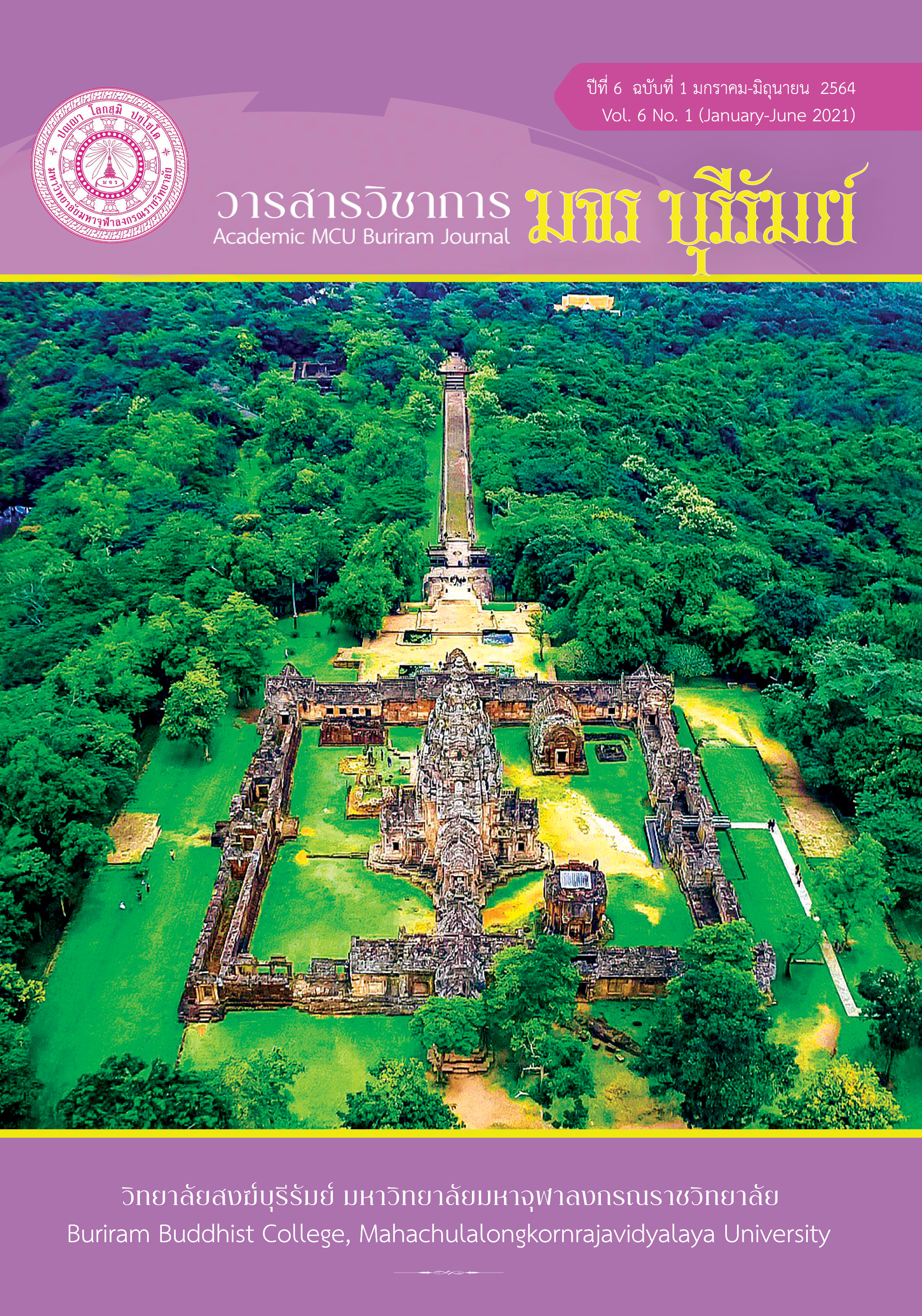The Hermeneutics Methodology of Buddhadasa Bhikkhu
Keywords:
Hermeneutics Methodology, Doctrines, Buddhadasa BhikkhuAbstract
Methodology of understanding thoroughly in order to achieve intuition in core religious principles of Buddhism via Hermeneutics of Paul Ricoeur can be called Hermeneutics Methodology of Phenomenological Existentialism according to Buddhadasa Bhikkhu’s term: “Theory of Attaining Pure Intuition”. It practically helps to transform Human-hood as secularization of human language to language of beyond secularization in Lokutara status through Buddhadasa Bhikkhu’s examples of historical phenomenal understanding on various external discourses of humane evidences in paradigms of humankind and religious language, Manual of Humanity and Theater of the Soul for revealing universal language on Arts of Lokiya phenomena so that emptiness can be intuited clearly.
References
กีรติ บุญเจือ. (2525). มนุษย์รู้ได้อย่างไร. กรุงเทพมหานคร: ไทยวัฒนาพานิช.
ปรุตม์ บุญศรีตัน. (2550). รูปแบบการตีความคัมภีร์ในพระพุทธศาสนาเถรวาท. วิทยานิพนธ์พุทธศาสตรดุษฎีบัณฑิต. บัณฑิตวิทยาลัย: มหาวิทยาลัยมหาจุฬาลงกรณราชวิทยาลัย.
พุทธทาสภิกขุ. (2482). พุทธสาสนา. หนังสือพิมพ์รายตรีมาศ. ของคณะธรรมทาน ภาคทั่วไป ภาคไตรปิฎกแปลไทย ภาคส่งเสริมปฏิบัติ “ตอบปัญหาบาดหลวง” ฉบับออกพรรษา และมาฆบูชา ปีที่ 7 เล่มที่ 3-4 พฤศจิกายน กุมภาพันธ์ 2482.
พุทธทาสภิกขุ. (2510). ภาษาคน-ภาษาธรรม. กรุงเทพมหานคร: อักษรสัมพันธ์.
พุทธทาสภิกขุ. (2529). คริสต์ธรรม-พุทธธรรม. กรุงเทพมหานคร: ธรรมสภา.
พุทธทาสภิกขุ. (2535). คู่มือมนุษย์-ฉบับสมบูรณ์. กรุงเทพมหานคร: ธรรมสภา.
พุทธทาสภิกขุ. (2548). ธรรมิกสังคมนิยม. กรุงเทพมหานคร: สุขภาพใจ.
พระเทพวิสุทธิเมธี (เงื่อม อินฺทปัญฺโญ). (2529). เล่าไว้เมื่อวัยสนธยา. กรุงเทพมหานคร: มูลนิธิโกมลคีมทอง.
พระธรรมปิฎก. (2538). พุทธธรรม. กรุงเทพมหานคร: มหาจุฬาลงกรณราชวิทยาลัย.
พระธรรมปิฎก (ป.อ. ปยุตตฺโต). (2542). กรณีธรรมกาย. กรุงเทพมหานคร: บริษัท สหธรรมิก จำกัด.
วิศรุ บวงสรวง. (2557). ก่อนจะมาเป็น “ธัมมิกสังคมนิยมแบบเผด็จการ: การเคลื่อนไหวทางความคิดของพุทธทาสภิกขุในทศวรรษ 2490 - พ.ศ.2509”. วารสารประวัติศาสตร์ธรรมศาสตร์, 1(1), 209-261.
สัมพันธ์ ก้องสมุทร. (2530). พุทธทาสภิกขุ นาคารชุนแห่งเถรวาท: ประวัติศาสตร์ชีวิตและ ผลงานพระเทพวิสุทธิเมธีมหาเถระประมวลภาพ 80 ปีแห่งความทรงจำและงานธรรมสมโภชน์ฉลองอายุฯ. กรุงเทพมหานคร: โอเดียนสโตร์.
Brede Kristensen. (1969). “The Meaning of Religion”, J.D. Bettis, (ed.). Phenomenology of Religion. London: Cambridge.
Kevin J. Vanhoozer. (1990). Biblical Narrative in the Philosophy of Paul Ricoeur: A Study in Hermeneutics and Theology. NY: Cambridge University Press.
Michael Seri Phongphit. (1978). The Problem of Religious Language: A Study of Buddhadasa Bhikkhu and Ian Ramsey as Models for a Mutual Understanding of Buddhism and Christianity. Doctoral Dissertation. Graduate School of Philosophy: München University.
Paul Ricoeur. (1976). Interpretation Theory: Discourse and the Surplus of Meaning. (Fort Worth, Texas: The Texas Christian University Press. https://clib.psu.ac.th/southerninfo/content/4/a72f775f (30 ธันวาคม 2563)
Downloads
Published
How to Cite
Issue
Section
License
ทัศนะและความคิดเห็นที่ปรากฏในบทความวารสารฉบับนี้ถือเป็นความรับผิดชอบของผู้เขียนบทความนั้น ไม่ถือเป็นทัศนะและความรับผิดชอบของบรรณาธิการ





